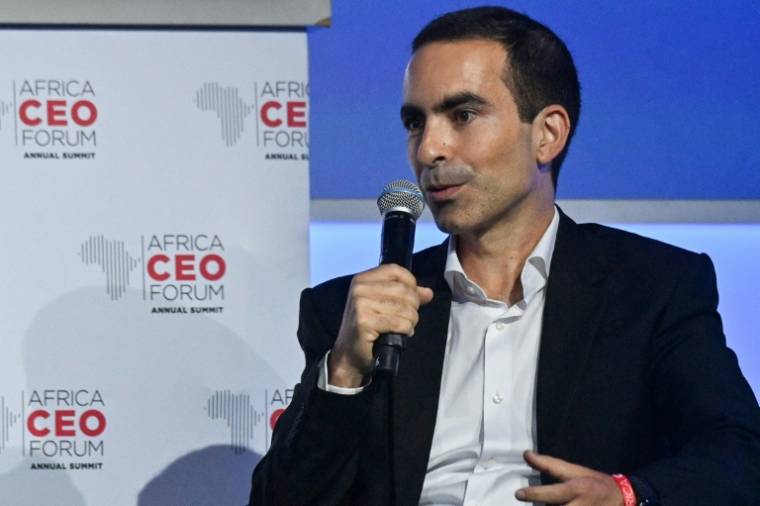The French CEO of InstaDeep, Karim Beguir, on April 8, 2024 in Paris (AFP / JULIEN DE ROSA)
Launched in Tunis “with two laptops and $2,000 in funding”, InstaDeep has become the locomotive of artificial intelligence in Africa, giving young Africans “the hope of being part of the innovation and technologies of tomorrow”, its co-founder, Karim Beguir, told AFP.
More than 600 million euros. This is the sum paid in January 2023 by the German laboratory BioNTech to buy this start-up launched in 2014 by this Franco-Tunisian engineer graduated from Polytechnique and Zohra Slim, a Tunisian self-taught person passionate about IT.
“It was an electric shock for the ecosystem. For the first time, we saw that a start-up started in Africa with very little resources could become a major international player. This showed that this type of story was possible”, underlines Karim Beguir, 47 years old, boss of the company whose headquarters are now in London.
“At the time, when I said that we were going to do things at the level of the biggest like Meta, Google DeepMind or other, everyone laughed in my face,” he remembers, satisfied with having today put “Tunisia and Africa on the global AI map”.
Specializing in “decision-making” AI, InstaDeep allows industrial players to develop concrete applications, capable of bringing them gains in terms of costs and efficiency.
At the height of the Covid-19 pandemic, the start-up stood out by developing with BioNTech a system capable of identifying the most dangerous variants “on average two months before their reporting”, according to data published in scientific journals.
In addition to its research on personalized cancer vaccines with the German laboratory, InstaDeep is working on projects to fully automate the rail routing of the German company Deutsche Bahn, improve the management of operations at Frankfurt airport or predict locust invasions. in Africa.
– Tunis, Lagos, Cape Town, Kigali –
Although it does not communicate its results, the company claims to be profitable and to achieve a turnover exceeding ten million euros.

Karim Beguir, CEO of Instadeep, during the Africa CEO Forum in Abidjan, June 13, 2022 in Ivory Coast (AFP / Issouf SANOGO)
From 60 employees in 2018, it now has 350, half of which are in Africa, with offices in Tunis, Lagos, Cape Town and Kigali, but also in the Middle East (Dubai), in Europe (London, Paris, Berlin) and in the United States (Boston, San Francisco).
“Thanks to the movement that we helped to start, young Africans have the hope of being part of the innovation and technologies of tomorrow, and in particular of AI which is THE technology of our generation,” assures Karim Beguir, who first worked in financial engineering in New York (JPMorgan, Bank of America), before launching into entrepreneurship on African soil.
“It is absolutely necessary for Africa to seize it because the alternative is the loss of traditional sources of activity, unskilled work. Just selling natural resources in their raw state is not enough. We must really create things with much greater added value,” argues the man who spent his childhood in Tataouine, in the south of Tunisia, before studying in France and then in the United States.
“The biggest threat is colonization by AI,” warned at the end of November the Senegalese teacher-researcher in artificial intelligence Seydina Ndiaye, one of the 38 experts selected by the UN to form a think tank on AI.
Especially since experts regularly point out certain racial or gender biases in the models designed by large tech companies.
“If young Africans develop applications for African communities, you are much less likely that there will be bias towards these populations than if they were developed in Silicon Valley or in Asia,” believes the boss of InstaDeep.
But when will Africa be able to create other AI champions?
“If we manage to channel this living force into high-level innovation, I would say that we will have ten InstaDeeps in 10 years,” predicts Mr. Beguir, provided that certain obstacles are resolved, such as the free movement of researchers on the continent.
“As incredible as it may seem, in certain cases, it is easier for a young African skilled in tech to come and work in France than to go to another African country. This is one of the obstacles that we must overcome,” he warns.
